
Computing is any goal-oriented activity requiring, benefiting from, or creating computing machinery. It includes the study and experimentation of algorithmic processes, and development of both hardware and software. Computing has scientific, engineering, mathematical, technological and social aspects. Major computing disciplines include computer engineering, computer science, cybersecurity, data science, information systems, information technology and software engineering.
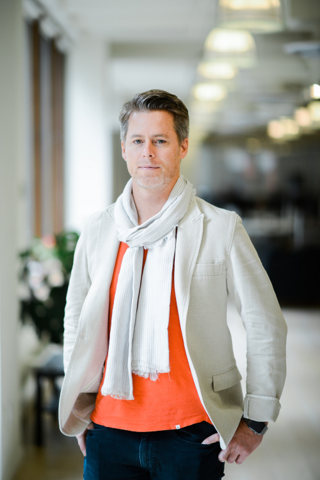
Spencer Kimball is an American computer programmer, entrepreneur, and business executive. He is the CEO of Cockroach Labs, a company he co-founded in 2014. His work as a programmer includes creating GNU Image Manipulation Program (GIMP) while still in college, and assisting the source code development of CockroachDB, the namesake software of Cockroach Labs. In addition to Cockroach Labs, Kimball was involved in the founding of other tech startups including WeGo and Viewfinder.

High-performance computing (HPC) uses supercomputers and computer clusters to solve advanced computation problems.
Ian Tremere Foster is a New Zealand-American computer scientist. He is a distinguished fellow, senior scientist, and director of the Data Science and Learning division at Argonne National Laboratory, and a professor in the department of computer science at the University of Chicago.
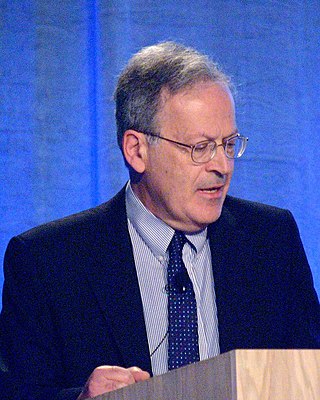
Leslie Gabriel Valiant is a British American computer scientist and computational theorist. He was born to a chemical engineer father and a translator mother. He is currently the T. Jefferson Coolidge Professor of Computer Science and Applied Mathematics at Harvard University. Valiant was awarded the Turing Award in 2010, having been described by the A.C.M. as a heroic figure in theoretical computer science and a role model for his courage and creativity in addressing some of the deepest unsolved problems in science; in particular for his "striking combination of depth and breadth".
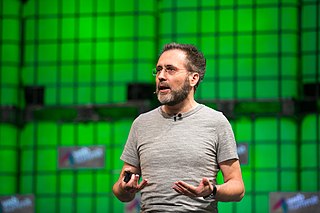
Urs Hölzle is a Swiss software engineer and technology executive. As Google's eighth employee and its first VP of Engineering, he has shaped much of Google's development processes and infrastructure, as well as its engineering culture. His most notable contributions include leading the development of fundamental cloud infrastructure such as energy-efficient data centers, distributed compute and storage systems, and software-defined networking. Until July 2023, he was the Senior Vice President of Technical Infrastructure and Google Fellow at Google. In July 2023, he transitioned to being a Google Fellow only.
RightScale was a company that sold software as a service for cloud computing management for multiple providers. The company was based in Santa Barbara, California. It was acquired by Flexera Software in 2018.
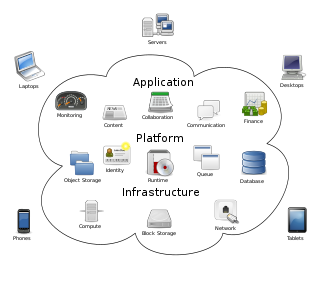
Cloud computing is the on-demand availability of computer system resources, especially data storage and computing power, without direct active management by the user. Large clouds often have functions distributed over multiple locations, each of which is a data center. Cloud computing relies on sharing of resources to achieve coherence and typically uses a pay-as-you-go model, which can help in reducing capital expenses but may also lead to unexpected operating expenses for users.

AppScale is a software company offering cloud infrastructure software and services to enterprises, government agencies, contractors, and third-party service providers. The company commercially supports one software product, AppScale ATS, a managed hybrid cloud infrastructure software platform that emulates the core AWS APIs. In 2019, the company ended commercial support for its open-source serverless computing platform AppScale GTS, however, its source code remains freely available to the open-source community.
Cloudera, Inc. is an American software company providing an enterprise data management and analytics platform. The platform is the only cloud native platform purpose built from the ground up to run on all major public cloud providers as well as on on-premises private cloud environments. It allows users to store and analyze data using hardware and software in cloud-based and data center operations, spanning hybrid and multi-cloud environments. Cloudera offers cloud-native analytics for data distribution, data engineering, data warehousing, transactional data, streaming data, data science, and machine learning.
Ignacio Martín Llorente is an entrepreneur, researcher and educator in the field of cloud and distributed computing. He is the director of OpenNebula, a visiting scholar at Harvard University and a full professor at Complutense University. Dr. Llorente is a IEEE Senior Member. He holds a Ph.D in Computer Science from UCM and an Executive MBA from IE Business School.
Mobile Cloud Computing (MCC) is the combination of cloud computing and mobile computing to bring rich computational resources to mobile users, network operators, as well as cloud computing providers. The ultimate goal of MCC is to enable execution of rich mobile applications on a plethora of mobile devices, with a rich user experience. MCC provides business opportunities for mobile network operators as well as cloud providers. More comprehensively, MCC can be defined as "a rich mobile computing technology that leverages unified elastic resources of varied clouds and network technologies toward unrestricted functionality, storage, and mobility to serve a multitude of mobile devices anywhere, anytime through the channel of Ethernet or Internet regardless of heterogeneous environments and platforms based on the pay-as-you-use principle."
Data-intensive computing is a class of parallel computing applications which use a data parallel approach to process large volumes of data typically terabytes or petabytes in size and typically referred to as big data. Computing applications that devote most of their execution time to computational requirements are deemed compute-intensive, whereas applications are deemed data-intensive require large volumes of data and devote most of their processing time to I/O and manipulation of data.
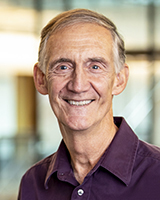
Edward D. "Ed" Lazowska is an American computer scientist. He is a Professor, and the Bill & Melinda Gates Chair emeritus, in the Paul G. Allen School of Computer Science & Engineering at the University of Washington.
WibiData was a software company that developed big data applications for enterprises to personalize their customer experiences. It developed applications based on open-source technologies Apache Hadoop, Apache Cassandra, Apache HBase, Apache Avro and the Kiji Project. Wibidata was founded under the name Odiago in 2010 by Christophe Bisciglia, Aaron Kimball, and Garrett Wu. Based in San Francisco, California, WibiData was backed by investors such as Canaan Partners, New Enterprise Associates, SV Angel, and Eric Schmidt.

PSSC Labs is a California-based company that provides supercomputing solutions in the United States and internationally. Its products include "high-performance" servers, clusters, workstations, and RAID storage systems for scientific research, government and military, entertainment content creators, developers, and private clouds. The company has implemented clustering software from NASA Goddard's Beowulf project in its supercomputers designed for bioinformatics, medical imaging, computational chemistry and other scientific applications.
Fog computing or fog networking, also known as fogging, is an architecture that uses edge devices to carry out a substantial amount of computation, storage, and communication locally and routed over the Internet backbone.
Cloud robotics is a field of robotics that attempts to invoke cloud technologies such as cloud computing, cloud storage, and other Internet technologies centered on the benefits of converged infrastructure and shared services for robotics. When connected to the cloud, robots can benefit from the powerful computation, storage, and communication resources of modern data center in the cloud, which can process and share information from various robots or agent. Humans can also delegate tasks to robots remotely through networks. Cloud computing technologies enable robot systems to be endowed with powerful capability whilst reducing costs through cloud technologies. Thus, it is possible to build lightweight, low-cost, smarter robots with an intelligent "brain" in the cloud. The "brain" consists of data center, knowledge base, task planners, deep learning, information processing, environment models, communication support, etc.
Azer Bestavros, is the Inaugural Associate Provost for Computing and Data Sciences and the William Fairfield Warren Distinguished Professor of Computer Science at Boston University. Prior to his appointment in 2019 to lead the Faculty of Computing and Data Sciences, he was the Founding Director of The Rafik B. Hariri Institute for Computing and Computational Science & Engineering. He joined Boston University in 1991 as an assistant professor in the Department of Computer Science, which is part of the university's College of Arts & Sciences. He was promoted to the rank of associate professor in 1998 and to the rank of full professor in 2003. From 2000 to 2007, he served as chair of the Department of Computer Science. Prior to joining Boston University, he worked as an instructor, teaching fellow, software engineer, and technical consultant for various organizations and technology companies, including the Eastern Mediterranean Regional Office of World Health Organization, Awad Associates, Harvard University, and AT&T Research Laboratories.

Atta ur Rehman Khan is a computer scientist and academician who has contributed to multiple domains of the field. According to a Stanford University report, he is among World's Top 2% Scientists. He is the founder of National Cyber Crime Forensics Lab Pakistan, which operates in partnership with NR3C. He has published numerous research articles and books. He is a senior member of IEEE and ACM.









